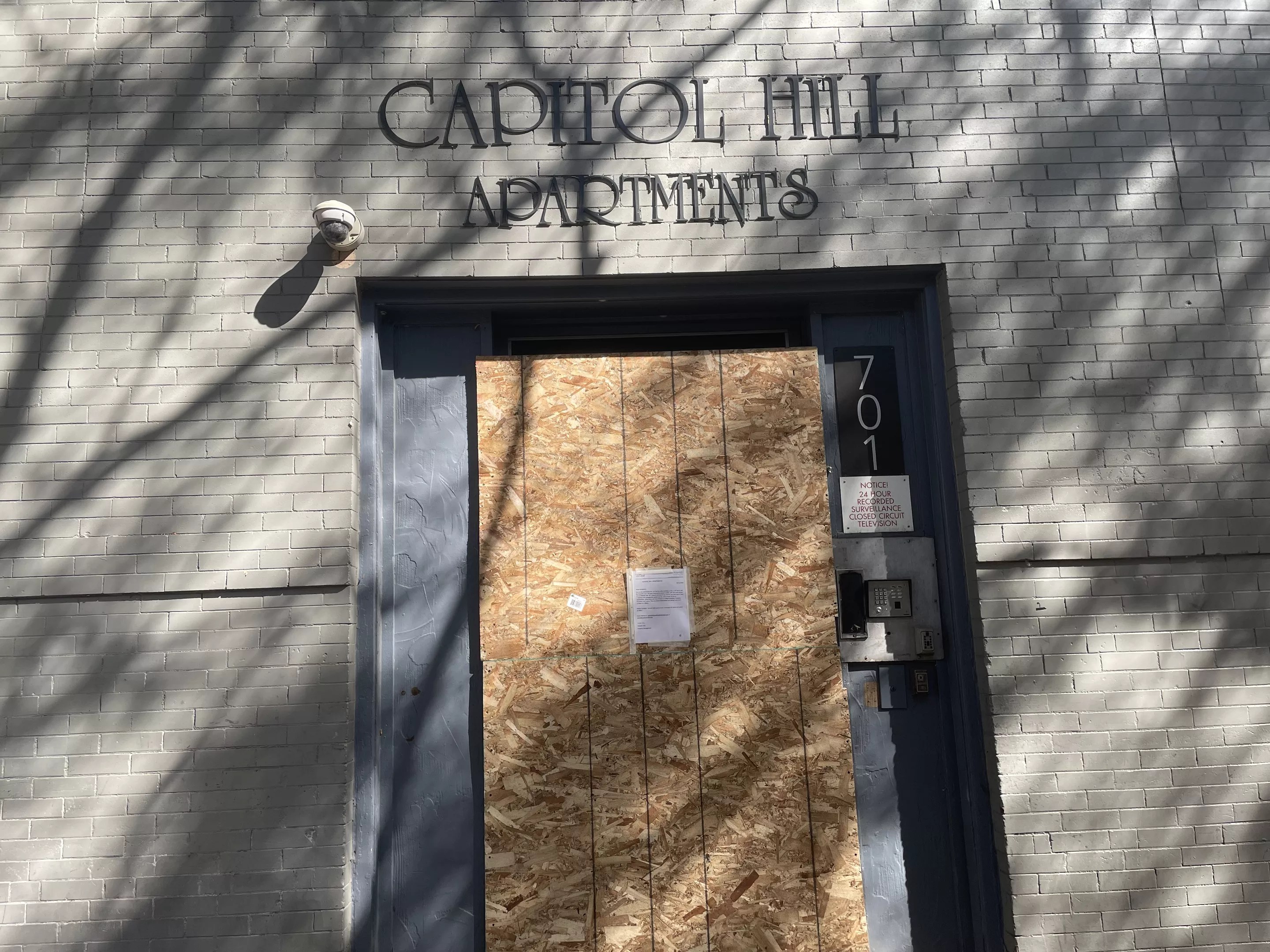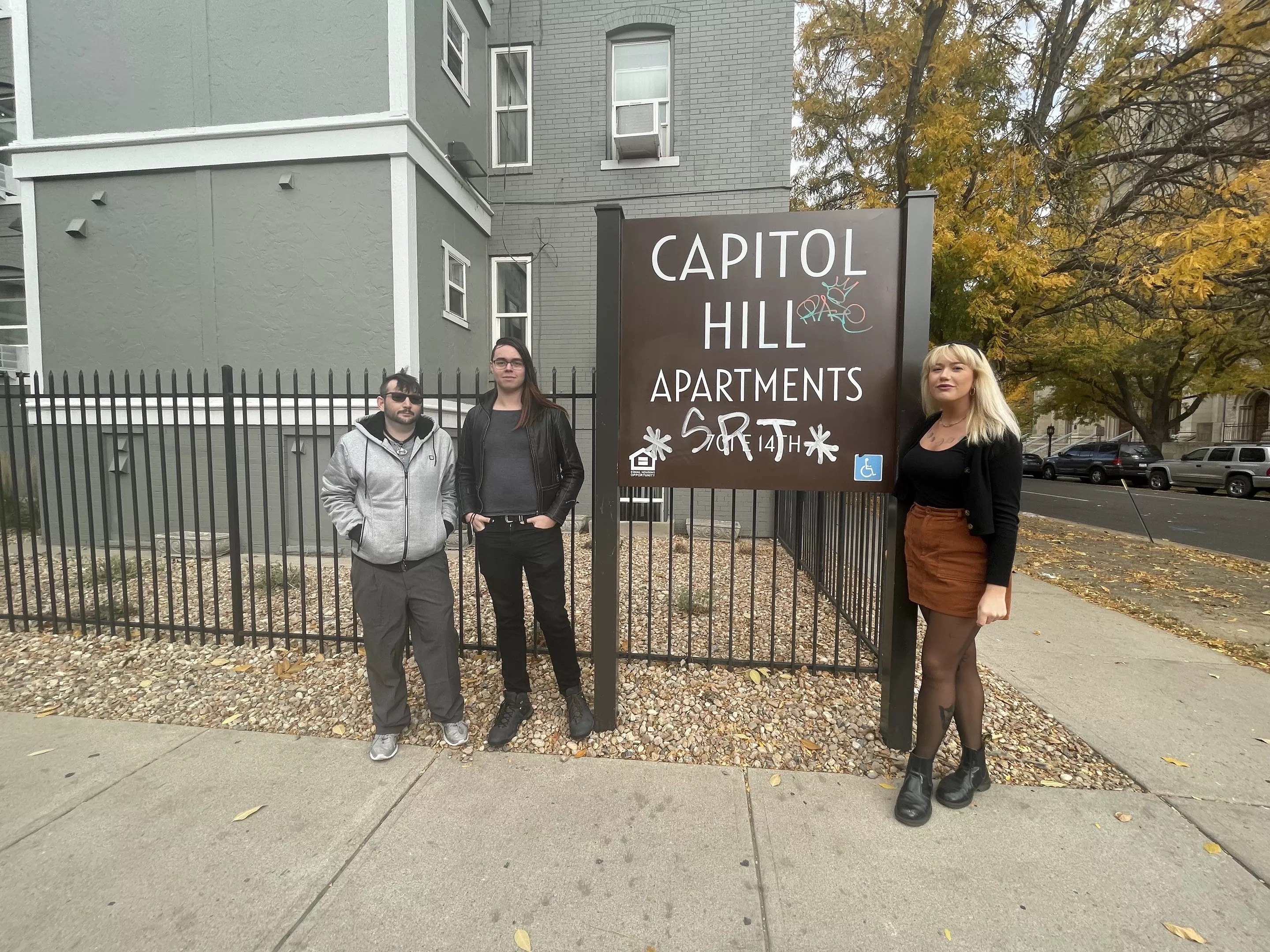
Catie Cheshire

Audio By Carbonatix
A fire at the Capitol Hill Apartments earlier this month forced all of its residents out, with no timeline for when the Section 8 building at 701 East 14th Avenue might be cleared for re-entry – leaving many people without belongings or any sense of help from property management.
“We were told to get what you need for the next couple days,” says tenant Scott Blevins, who has lived at the building for nearly eight years. “A lot of people are beating themselves up about not grabbing more at this point.
“I haven’t been directly contacted [by management],” he tells Westword. “They did leave a note on my door at the hotel, but some people are already talking that they’ve applied for housing and that they’re moving. And then some people said that they’re staying, and I don’t know what to believe.”
The blaze tore through the complex on the afternoon of September 7, with residents having to move quickly. “I woke up, and I barely got dressed and grabbed my phone, and I opened the door and it was full of smoke,” Blevins recalls. “I know it happened, but it still doesn’t seem 100 percent real.”
After the Denver Fire Department extinguished the blaze, tenants were allowed in to grab a few things, but most didn’t expect it would be this long until they were able to return. Blevins says he didn’t consider the changing weather, and didn’t even grab a jacket for chilly fall mornings.
According to Blevins, Avail Property Management has not been responsive when asked about a timeline for moving back in or about the possibility of stopping by to pick up a few more items. This follows the pattern he’s experienced in his time living at the Capitol Hill Apartments, he says.
The entire property includes nine buildings, but the one at 701 East 14th unionized last November to try to hold Avail accountable for a range of issues, including a lack of security and failure to communicate with residents about maintenance issues.
The Capitol Hill Apartments Tenants Association became the first Denver chapter of Denver Aurora Tenants United, which advocates for housing dignity across the metro area. “At first we had a lady that was really working with us,” Blevins says of Avail’s response to the community unionizing. However, that person no longer works there, and Blevins claims the same old issues have persisted, despite marginal improvement.
“There’s still a communication problem, but it’s better than it was,” he says. “We continue to have problems with people getting in the building that shouldn’t have been. There were cameras torn down that I feel like should have been replaced very quickly that weren’t.”
In the original letter the union sent to management last fall, it identified problems with the building’s electrical circuit, including an unlocked switch box that allowed access to anyone and lacked security. “It has always been a problem,” Blevins says. “We have neighbors that we have to go run and flip the breaker for every day because it just pops and then they have no power in their unit.”
The electrical system caused the fire, according to the Denver Fire Department report on the incident, which Westword obtained through a Colorado Open Records Act (CORA) request.
“Upon investigation, it was determined that there was an electrical panel in the first floor hallway that was short circuiting and sending sparks to the surrounding area,” the report says. “Smoke conditions worsened and further investigation revealed a fire burning inside of the electrical panel and behind the wall adjacent to the panel.”
The official cause of the fire was confirmed as a malfunction of the electrical panel equipment.
Even before the blaze, the property had been identified as an issue by the city for performing work without a permit.
According to city documents, it was issued a Stop Work Order on September 6, which read: “Stop work order posted for penetrations made to potentially structural exterior wall.”
The building was required to get a permit by September 14 and pay a late fee for not having the correct documents in the first place. If such an order is violated, the penalty is a $99 fine or 180 days in jail – or both.
Avail is part of a national company known as PK Management outside of Colorado. Christopher Baca, senior director of community development for PK Management, says a misunderstanding with the contractor related to permits is what ultimately caused the problem.
“The work stoppage was related to through wall brick cuts that were being made,” Baca added.
Residents haven’t been in the building since September 7.
After being evacuated, the tenants headed to the American Red Cross, which has helped them find places to stay at hotels. Blevins says the Red Cross has been helpful and communicative in a way that building management hasn’t.
Communication among residents has been made harder by the fact that they aren’t all in the same hotel – or even the same city. Blevins is at a hotel in Centennial; others were sent to Lakewood; several were sent to Thornton.
Being scattered across the metro area has been difficult for many, as their lives were centered around the Cap Hill area. Blevins, for example, has had to find a way to get downtown in order to see his doctor and replace certain medications he left behind in a hurry after the blaze. While the community is strong, it’s been tricky to coordinate who has what information and to support each other.
“Personally, my closest friends are not at the hotel I’m at, and that’s been a little hard,” Blevins says. “My go-to people are on the other side of town.”

Scott Blevins (left) with organizers Lena Hunicke-Smith and Eliza Lucero last November.
Catie Cheshire
In response to the crisis, Baca says PK Management sends its condolences to the displaced residents.
“The Red Cross and our Community Development and Social Services Team are working with the households, one on one, and connecting them to donations and other community resources throughout the Denver Metro Area,” Baca says. “The Red Cross is also providing residents with monetary donations to assist in the interim.”
According to Baca, it is still not safe for residents to return to their homes, and the company does not have a timeline for when they might be able to. “Once clearance is issued, every unit will be notified when they are able to enter their unit to gather belongings,” he added. “Management is also working with residents to find alternate housing throughout the Denver area.”
Baca says PK Management will work with each family to find “suitable alternate housing,” and that those with questions should reach out to the company directly.
According to the DFD report, there is an estimated $150,000 in property losses and $50,000 in content losses.
The building is covered by Section 8 housing, which is overseen by the U.S. Department of Housing and Urban Development. According to Angelo Dalmacio, of Rocky Mountain HUD, property management is responsible for providing “temporary relocation that meets a minimum of basic needs.”
He adds, “For tenants who are displaced for a longer period of time due to the situation and repairs necessary, the owner or agent is required to provide each household with alternative housing. HUD works with the owner to process subsidy pass-through requests to support this effort. During this displacement, HUD requires the owner/agent to provide updates on the process and locations of all tenants. In this instance, HUD will conduct a site visit at the property following the repairs.”
According to the Denver Housing Authority, if the property is eventually deemed uninhabitable, residents will immediately be issued another voucher.
While management works on repairs, Blevins says he and his neighbors are figuring out what to do. After the union had successfully marginally improved the management situation, they went from meeting weekly to more occasional meetings, and hadn’t had one recently. Although they’re spread out now, their current situation has spurred them to try to work together again.
“We’re scrambling to try to get back together,” Blevins says. “Being at different buildings and everybody having different information is making it really difficult to be one united group.”